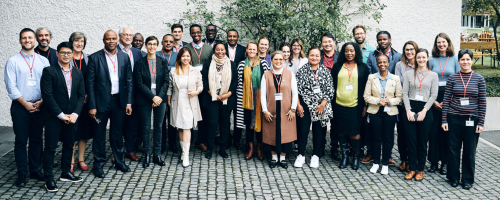Friday, January 12, 2024 — OECS member states are not strangers to natural hazards such as hurricanes, earthquakes, and droughts.
The region’s vulnerability has been exacerbated by the increasing frequency and severity of extreme weather events brought on by climate change. Vulnerable groups, such as women, children, indigenous communities, and the elderly, are particularly affected by environmental disasters and displacement. Yet, a lack of reliable and timely data on human mobility and environmental factors hinders informed planning and policy development.
The 2017 hurricane season, one of the most destructive on record, served as a wake-up call. OECS member states have realised the urgent need for regional and economic integration to create a more dynamic, responsive, and self-sustaining community.
The OECS Commission has been collaborating with the German Agency for International Cooperation (GIZ) to address human mobility, noting that it has emerged as a critical form of adaptation to the region’s increasing environmental challenges. This includes the impact of climate change on the economy, infrastructure, and natural resources. Some of the initiatives undertaken include:
Strategic Thinking on Climate Change Impact
The OECS, with financial and technical support from GIZ, has conducted scenario workshops to enhance strategic thinking among staff and border officials under the Human Mobility in the Context of Climate Change (HMCCC) project. These workshops have highlighted the need for financial resources to build resilience in the face of climate change. This aligns with global efforts to bridge the financing gaps related to climate change in developing regions.
Capacity Building Among Border Officials
Between 2020 and 2022, several workshops were conducted aimed at enhancing the capacity of various agencies to address cross-border movements due to environmental impacts. These sessions benefitted approximately 320 personnel across agencies, fostering cross-agency collaboration to address the complex interrelated forces influencing mobility outcomes.
Knowledge Products for Informed Policy
The HMCCC project produced a range of knowledge products to support informed policy development:
- A report on “Human Mobility in the Context of Climate Change and the Implications of the Covid-19 Pandemic” provides policy guidance on the nexus between climate-induced migration and pandemic-related mobility.
- A training manual offering guidance to officials seeking to replicate the Capacity Building Programme.
- A report titled “Financing Human Mobility in the Context of Climate Change” which examines available financing options and addresses financing gaps.
- A report based on research on “Gender and Human Mobility in the Context of Climate Change” which explores gender issues related to climate-induced migration, emphasizing the need for gender-inclusive policies and a gender-sensitive approach to disaster planning.
- Standard Operating Procedures (SOPs) and Guidelines for Cross-Border Disaster Displacement in the OECS have been developed to guide key agencies within member states.
In October 2023 representatives of the Organisation of Eastern Caribbean States (OECS) Commission shed light on the pressing issue of Human Mobility in the Context of Climate Change (HMCCC) during a knowledge-sharing event hosted by the German Agency for International Cooperation (GIZ) in Bonn, Germany.
The OECS knowledge products contributed in part to the “Human Mobility in the Context of Climate Change” e-learning course that was exhibited during the GIZ event. The course covers key concepts such as climate-related migration, disaster displacement, planned relocation, and trapped populations, which serve as the building blocks for understanding how climate change intersects with human mobility. The course was designed to provide a comprehensive educational platform for a diverse audience, including policymakers, development professionals, researchers, and students with the knowledge and tools to understand and manage the effects of climate change on human mobility.
The OECS is committed to mitigating the impacts of climate change on human mobility and ensuring the protection of vulnerable populations from displacement and forced relocations. By addressing these issues head-on and implementing proactive strategies, the OECS is working towards a more resilient and sustainable future. The region’s response to the challenges of climate-induced migration serves as a model for the world in an era where climate change is a pressing concern.

